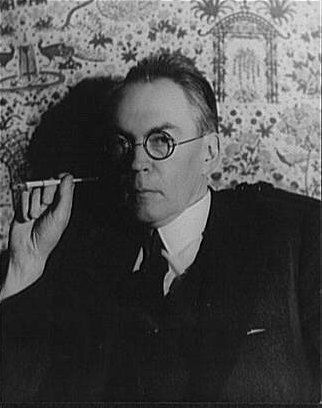People marry through a variety of other reasons, and with varying results : but to marry for love is to invite inevitable tragedy.
"The Cream of the Jest"; Por James Branch Cabell, Harold Ward; Colaborador Harold Ward; Publicado por Kessinger Publishing, 2005; ISBN 0766194892, 9780766194892; 264 páginas; http://books.google.com.br/books?id=0GdVNipGRxYC&pg=PA235&dq=People+marry+for+a+variety+of+reasons+and+with+varying+results.+But+to+marry+for+love+is+to+invite+inevitable+tragedy. - Página 235
James Branch Cabell Frases famosas
The optimist proclaims that we live in the best of all possible worlds; and the pessimist fears this is true.
The Silver Stallion (1926)
Variante: O optimista diz que vivemos no melhor de todos os mundos possíveis. O pessimista teme que isso seja verdade.
A book, once it is printed and published, becomes individual. It is by its publication as decisively severed from its author as in parturition a child is cut off from its parent. The book "means" thereafter, perforce, — both grammatically and actually, — whatever meaning this or that reader gets out of it.
"A Note on Cabellian Harmonics" in Cabellian Harmonics (April 1928)
Criticism, whatever may be its pretensions, never does more than to define the impression which is made upon it at a certain moment by a work wherein the writer himself noted the impression of the world which he received at a certain hour.
Epígrafe de "The Certain Hour" (1916)
James Branch Cabell: Frases em inglês
Author's Note (1929 edition)
The Cream of the Jest (1917)
Horvendile, in Ch. 13 : What a Boy Thought
The Way of Ecben (1929)
"Auctorial Induction"
The Certain Hour (1916)
"Auctorial Induction"
The Certain Hour (1916)
Guivric, in Book Six : In the Sylan's House, Ch. XL : Economics of Glaum-Without-Bones
The Silver Stallion (1926)
I know, for already we of Philistia have been pestered by three of these makers of literature. Yes, there was Edgar, whom I starved and hunted until I was tired of it: then I chased him up a back alley one night, and knocked out those annoying brains of his. And there was Walt, whom I chivvied and battered from place to place, and made a paralytic of him: and him, too, I labelled offensive and lewd and lascivious and indecent. Then later there was Mark, whom I frightened into disguising himself in a clown's suit, so that nobody might suspect him to be a maker of literature: indeed, I frightened him so that he hid away the greater part of what he had made until after he was dead, and I could not get at him. That was a disgusting trick to play on me, I consider. Still, these are the only three detected makers of literature that have ever infested Philistia, thanks be to goodness and my vigilance, but for both of which we might have been no more free from makers of literature than are the other countries.…
The Judging of Jurgen (1920)
What matter names?
He is only a scribbler who is content.
"Auctorial Induction"
The Certain Hour (1916)
Fonte: The Cream of the Jest (1917), Ch. 40 : Which Mr. Flaherty Does Not Quite Explain
are none the less valuable for being quoted.
The Gander, in Book Seven : What Saraïde Wanted, Ch. XLV : The Gander Also Generalizes
The Silver Stallion (1926)
Writing on Charles Dickens, in "In Defence of an Obsolete Author" in William and Mary College Monthly (November 1897), VII, p. 3-4
